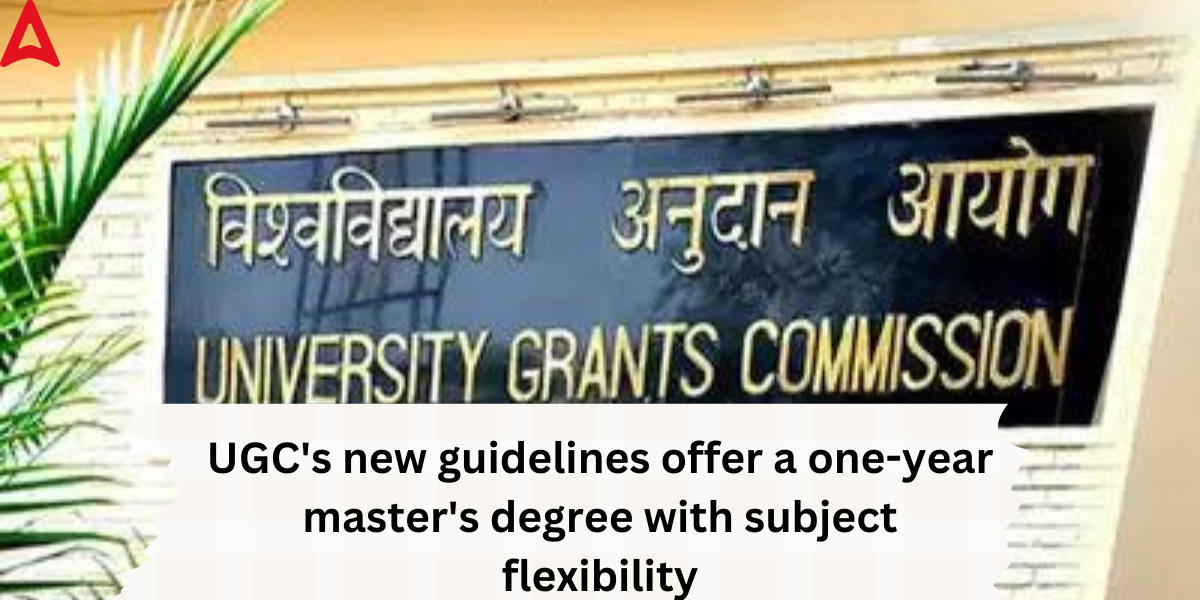The University Grants Commission (UGC) has released a draft curriculum and credit framework for postgraduate degrees, which proposes a one year PG programme with subject flexibility. In accordance with the recommendations of the new National Education Policy (NEP), the UGC is considering enabling students with a four-year undergraduate degree to undertake a one year PG programme. Read the whole to know the UGC’s new draft guidelines on postgraduate programmes.
UGC New guidelines on one year programme
The University Grants Commission (UGC) has recently drafted new guidelines on postgraduate programmes. This curriculum, which is aligned with the ideals of the National Education Policy (NEP), intends to give students the freedom to transfer between different fields of study. The recommendations should be made public soon after The Commission has solicited suggestions, comments, and feedback on the draught Guidelines for Curriculum and Credit Framework designed for Postgraduate studies in order to solicit input from diverse stakeholders.
Join Today CUET PG 2024 Achievers Batch
One year programme for Master’s Degree
The following are highlights from the UGC’s New Curriculum and Credit Framework for one year programme:
- The UGC has proposed three postgraduate programme designs: A one year programme, a two-year Master’s, and a five-year integrated curriculum are available.
- Students who have completed a four-year Bachelor’s degree programmes with Honours and research components are eligible to register for a one year PG programme study.
- Those who complete a three-year Bachelor’s degree curriculum are eligible for a two-year postgraduate degree study, with the second year devoted to research.
- Students are eligible for a master’s programme in a discipline that corresponds to either their major or minor discipline in their undergraduate study. Furthermore, entrance exams may be used as a criterion for admission.
- Students studying a two-year PG curriculum will have the option of exiting after the first year and receiving a postgraduate diploma.
- Guidelines also recommend a five-year combined Bachelor’s and Master’s curriculum.
- The regulations allow students to pursue two Master’s degrees at the same time. They can choose between two full-time academic programmes in the physical mode or a mix of two full-time academic programmes in the physical mode and one in the Open and Distance Learning (ODL) or Online mode.
- Graduates with dual majors can choose either subject for their Master’s degree, whereas those with a major and minor can choose either for their postgraduate degree.
Big Changes in CUET PG 2024
Watch the video to learn about the major changes in CUET PG 2024 due to UGC’s one year PG programme
UGC syncs for one year PG programme
In accordance with the recommendations of the new National Education Policy (NEP), the University Grants Commission (UGC) is considering enabling students with a four-year undergraduate degree to undertake a one year PG programme. The UGC PG programme is available in three formats: one year programme, two-year master’s, and an integrated five-year degree.
Students who have completed a four-year bachelor’s degree programmes with honours and a research component will be able to register in a one year PG programme. After completing the three-year bachelor’s curriculum, students will be eligible for a two-year postgraduate programme, with the second year devoted fully to research. After one year, students can opt out of this programme and pursue a PG diploma instead. The guidelines also recommend a five-year combined bachelor’s and master’s degree. The UGC has also advocated allowing students to switch from one discipline of study to another based on their preferences.
Subject flexibility in Postgraduate programmes
According to the new standards, The UGC has also advocated allowing PG students to switch from one discipline of study to another based on their preferences. It also suggests that students who graduate with a double major have the option of choosing any of the two topics in which they majored. Those who complete their undergraduate studies with a major and a minor (s) will be able to choose either a major or a minor (s) subject for their master’s degree.
According to the draught guidelines of the new National Education Policy (NEP 2020), students can switch to disciplines that are different from what they learned in their undergraduate programmes. “Irrespective of the major or minor disciplines chosen by a student in a UG programme, a student is eligible for admission in any discipline of master’s programmes if the student qualifies the national level or university level entrance examination in the discipline of the master’s programme,” according to the guidelines.
However, considering that there are bachelor’s (Hons.) and bachelor’s (Hons. with Research) degrees in 4-year UG, crediting work experience, combining disciplines with developing fields such as AI, Machine Learning, and so on, the number of curricular frameworks is significantly bigger. As a result, higher education institutions develop curricula based on graduate traits.
Students who studied STEM topics will also be entitled to pursue technical degrees such as master’s degrees in engineering or master’s degrees in technology (ME or MTech) or related fields.
CUET PG 2024 General {COQP11} Achievers Batch
Introduction of Modes of Learning
According to the new standards, PG students will be able to change fields or choose alternative modes of learning like offline, distant, online, and hybrid models. As per the UGC’s New guidelines on Postgraduate programmes, The new criteria have provided students the option of pursuing two master’s level academic degrees. Students can pursue two full-time academic programmes in the physical mode or a mixture of two full-time academic programmes in the physical mode and one in the Open and Distance Learning (ODL) or Online mode.
Course Components in Master’s Degree
The three types of master’s programmes, which will be aligned with the National Higher Education Qualifications Framework (NHEQF) and National Credit Framework (NCrF), will be structured in such a way that “creditization” of all learning and assignment, accumulation, storage, transfer, and redemption of credits, subject to assessment, will be facilitated, according to the guidelines.
- Students pursuing a two-year postgraduate degree can choose to undertake solely coursework in the final semester of each year, or coursework in the third semester and research in the fourth. These students can also devote their entire second year to research.
- In the five-year integrated programme, the same components will be relevant at the postgraduate level. Students will receive a total of 40 credits regardless of their decision. Students in the one year PG programme will be able to conduct coursework, research, or a mix of the two for a total of 40 credits.
| Qualification | Level | Credits |
Total Credit Points
|
| PG Diploma | 6 | 40 | 240 |
| 1-Year PG after 4-year UG | 6.5 | 40 | 260 |
| 2-year PG after 3-year UG | 6.5 | 40+40 | 260 |
| 2-Year PG after a 4-year UG such as BE, BTech | 7 | 40+40 | 280 |









 How to Calculate CUET Score, Check Marks...
How to Calculate CUET Score, Check Marks...
 CUET Cut Off 2025 (OUT) Soon: Minimum Qu...
CUET Cut Off 2025 (OUT) Soon: Minimum Qu...
 CUET PG Cut Off 2026, Expected Course wi...
CUET PG Cut Off 2026, Expected Course wi...









